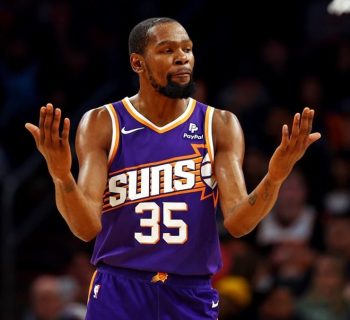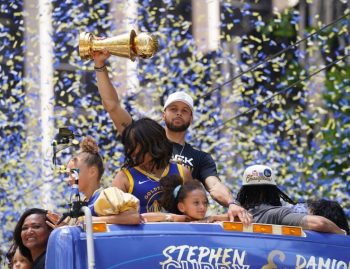NBA
NBA AM: Still No Deal With Thompson And Cavs

No Deal
The Cleveland Cavaliers and forward Tristan Thompson made no progress towards a new deal over the weekend, according to ESPN’s Brian Windhorst.
The report doesn’t come as much of a surprise considering that Thompson and the Cavs have been fairly far apart for most of the summer, after what appeared to be a deal in early July. While the situation seems tumultuous, the truth of the matter is that Thompson has until October 1 to sign the Cavaliers’ $6.77 million Qualifying Offer the Cavs gave him to make him a restricted free agent.
The Cavaliers have been very clear that they are not going to trade Tristan and would rather see him play out the season and address his free agency next summer when the salary cap is significantly higher and there is less impact from a luxury tax point of view. Thompson, through his agent Rich Paul, has been fairly aggressive in trying to frame the situation as Tristan having other options that he’ll explore if the Cavaliers do not make a long-term contract commitment now.
Thompson is not expected to report for Cavalier Media Day, which will get underway in Cleveland today. However, it will be interesting to see if Thompson does report for the first formal practice session, which will get underway tomorrow.
Cavaliers star LeBron James organized a number of off-season teambuilding activities this summer, including an in-depth mini-camp session in Miami. Thompson was notably absent. Thompson and James share the same representation and James has been vocal that keeping Thompson is important to the Cavaliers’ goal of winning a championship.
It was believed Thompson and the Cavs were close to a multiyear deal worth some $80 million in early July. However, when free agency opened and contract money started flowing, players in Thompson’s peer group started to receive far more on an annualized basis than what was being discussed with the Cavaliers. Both the Cavs and Thompson have tried to make it clear they were not close to a deal in July and given where things stand today it seems like they’re not close to a deal at all.
It’s been characterized that if Thompson signed the Cavaliers’ Qualifying Offer, which is expected, that he would play out the season and explore his free-agent option next July with Paul saying Thompson would not return to Cleveland if that was the result. While the rhetoric is interesting in the context of trying to force a new deal, not reaching an agreement on a long-term deal and ultimately signing the Qualifying Offer doesn’t necessarily mean the end of the road for Thompson and the Cavs, but it does make the situation far more interesting. If Thompson signs the Qualifying Offer, he will gain veto power on any trade and by waiting until October 1 Thompson pushes his ability to be traded out 90 days.
The Cavaliers are considered by many to be the front runners to win the East. However, the Thompson situation will likely become an unnecessary distraction. It will be interesting to see if something gets done in the next two days.
The Virtue Of The Buyout
As training camp opens in the NBA for most of the league, a couple of lingering transactions dropped over the weekend. The Portland Trailblazers reached a buyout with veteran forward Mike Miller, the Philadelphia 76ers waived Gerald Wallace and the Minnesota Timberwolves, who waived former number one overall pick Anthony Bennett, saw him clear waivers.
What makes the situation with these three interesting is the large amount of money all three will be paid to play for other teams.
In the current NBA economy and under the current trade rules teams often are required to trade dollar for dollar to complete transactions. Meaning teams end up taking on players or contracts they do not necessarily want in exchange for assets that may be more appealing. We have also seen a new secondary trade market emerge in which teams with salary cap space willingly take on large contracts they had no intention of keeping simply to gain draft picks and young players as part of the transaction.
In the case of the Philadelphia 76ers, they took on Wallace as part of the Jason Thompson to Golden State deal, and gained the right to swap first round picks and some cash for their trouble. On the surface it seems foolish for teams to invest so much money in some players they have no intention of playing, but the reality is that every NBA team has a minimum amount of money they must pay out under the collective bargaining agreement. Some teams have decided that leveraging that money in exchange for future assets is better than parking a large dollar contract on the roster that they don’t intend on playing. Cap management has become a science in the NBA and for some teams leveraging cap space has become big business. The Philadelphia 76ers have leveraged their space for the last several seasons and have collected an impressive array of picks and young talent.
The Timberwolves were on the hook for more than $5.8 million with Bennett, who opted for a buyout and a reduced payment in order to find an opportunity to play. Bennett agreed to a NBA minimum deal with the Toronto Raptors. The Wolves gained nothing material in the transaction. They simply reduced the amount they owed to Bennet after failing to find a suitable trade for him.
Mike Miller opted into the final year of his contract while with the Cavaliers knowing that he was likely going to be traded. Miller was moved as a cap-clearing measure by the Cavs as part of the Brenden Haywood trade. Miller did not take part in any of Portland’s off-season activities. The Blazers had hoped to find a trade, but with no trade on the horizon, the Blazers and Miller agreed to part ways. Assuming he clears the waiver process, Miller is expected to sign with a new team on his quest for another championship. At this point it’s unclear where Miller will ultimately land but the Denver Nuggets are said to be a serious candidate for his services.
From the outside, it seems silly how much money gets paid out to players not to be on a particular team, however, with the trade rules as they are, some teams see value in the assets they can collect by allowing players to be parked on their salary cap. This is simply the way business gets done.
Not every trade or transaction is about the product on the floor. Sometimes the transactions are for reducing costs or collecting assets for the future
More Twitter: Make sure you are following all of our guys on Twitter to ensure you are getting the very latest from our team: @stevekylerNBA, @AlexKennedyNBA, @LangGreene, @EricPincus, @joelbrigham, @SusanBible, @TommyBeer, @MokeHamilton, @JCameratoNBA, @iamdpick, @jblancartenba and @CodyTaylorNBA.













